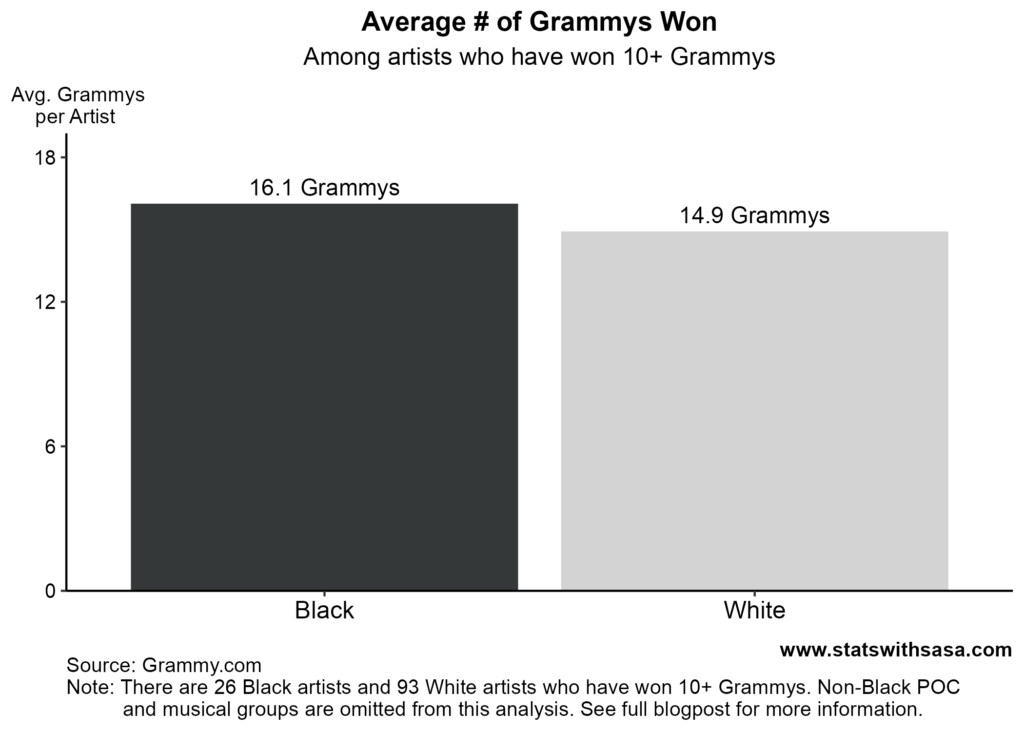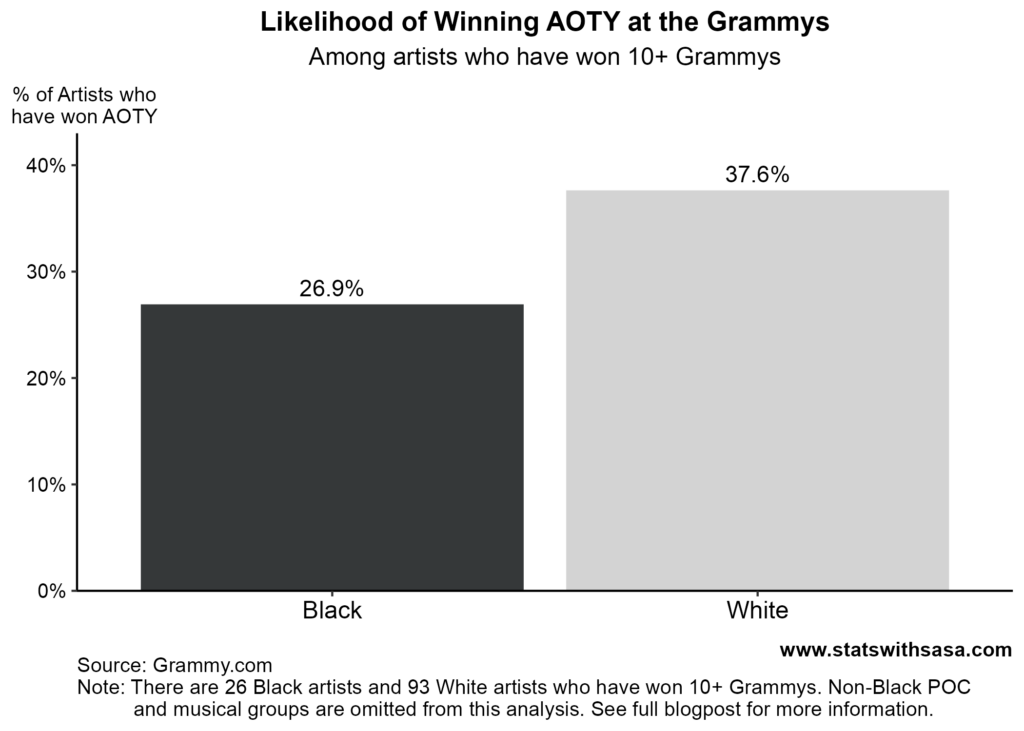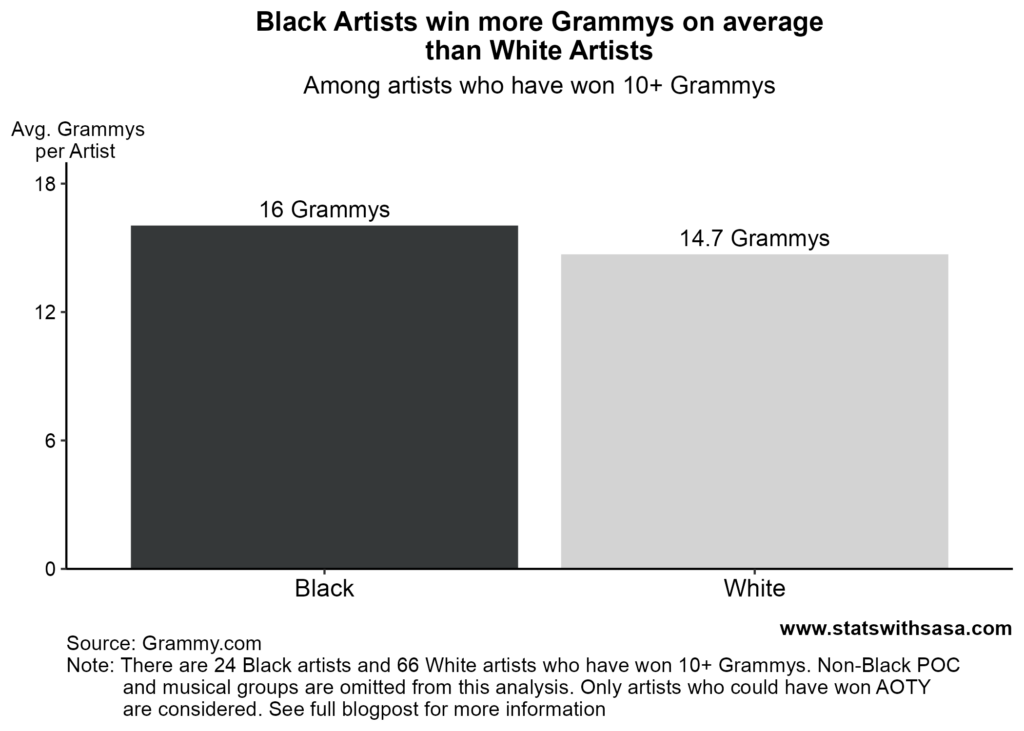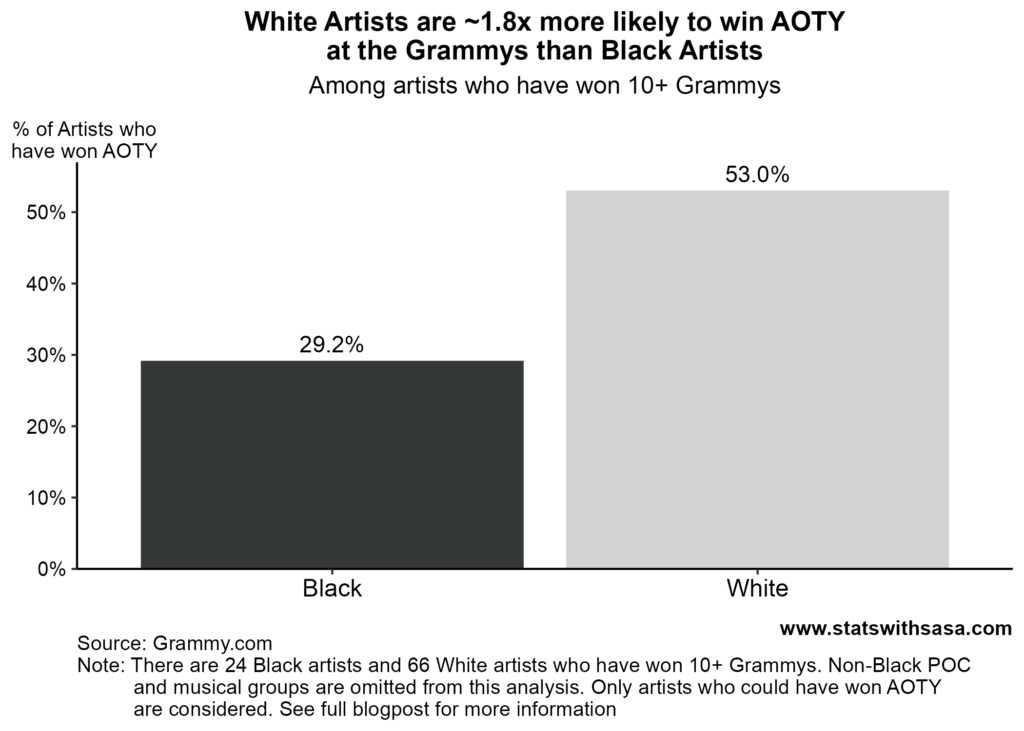Fact or Fiction is a series where I tackle popular internet narratives and use data analytics to check how true they are.
At this year’s Grammy Awards, Jay-Z gave a speech about his wife Beyonce’s repeated Album of the Year (AOTY) snubs. As he argued, in a blatant example of structural racial bias, Beyonce has never won AOTY despite having won the most Grammys in the show’s history. Meanwhile, there are White artists like Harry Styles, who has already won AOTY despite having a paltry 3 total Grammy wins (less than 10% of Beyonce’s 32 wins).
In the ensuing few days, news outlets and social media around the country have echoed in agreement, and a general conclusion has been reached: the Grammys repeatedly favor White artists over Black artists when awarding AOTY.
But this is Stats with Sasa. We’re too smart to fall for anecdotal evidence. Yes, Beyonce has probably been snubbed here. But we need more evidence to show a consistent pattern of racial bias when awarding AOTY. So, obviously, we need to look at the data. For this analysis, I scraped award winner data from the Grammy’s official site.
Article guide (click to skip ahead):
An Initial Look
To properly evaluate Jay-Z’s argument, we need an apples-to-apples comparison to Beyonce. Although some may argue that Beyonce is incomparable, we can look at other artists who have won multiple Grammy awards and see if race plays an impact on how many of them have won AOTY. For this analysis, I considered all artists who have won 10 or more Grammys. This cutoff is a little arbitrary, but 10 is a nice number and it includes the top 2% of Grammy winners. For more information about the methodology used in this analysis, click here.
First, we can check if Black artists in this group tend to be more successful White artists.

Okay, it looks like among this group, Black artists tend to win more Grammys on average than their White counterparts. Let’s see if this reflects in AOTY wins.

So it looks like there is some evidence to back up Jay-Z’s point. Despite winning more Grammys on average, Black artists are less likely to win AOTY than their White counterparts. However, we must note that this difference is not huge.
A More Accurate Comparison
You may have noticed a couple flaws in the above analysis. Perhaps first and foremost: not all Grammys are created equal when considering AOTY snubs. There are many Grammy categories that have no overlap with AOTY. For example, the winner of Best Polka Album has never won AOTY at the Grammys. Moreover, people are credited in different ways when winning Grammys (songwriter, producer, etc.), and not all of these winner types are considered when awarding AOTY. For example, a choir director has never won AOTY. We can adjust our analysis to only consider artists who could have won AOTY based on their Grammy category and artist type (see methodology for more information about this).
First, let’s again see which group wins more Grammys after we make this correction.

Again, we see that Black artists win more Grammys on average than White artists. The difference between the two groups is actually slightly larger in this adjusted analysis. Now let’s see if this translates to better AOTY odds.

The conclusion from this chart is stark. In our pool of Grammy winners, White artists are nearly two times more likely to win AOTY than their Black counterparts. In other words:
There is evidence Jay-Z was right. Despite winning more Grammys on average than White artists, Black artists are far less likely to win AOTY
Conclusions
We probably didn’t need Jay-Z to tell us that entertainment industry awards have long suffered racial issues. Unlike a lot of internet commentators, I don’t even think the issue is necessarily intentionally malicious (recently, that is). We all suffer from implicit biases, and awards voters are no different. The thing about implicit biases is that they’re implicit, and they usually happen without thinking. That’s why pointing out these issues is so important — it allows us to recognize and correct these implicit biases.
Anyway, thanks for letting me get on my soap box for a second. And as always, thanks for reading. If you liked this article and want to read more like it, consider subscribing to my blog below!
Methodology
Authors note: This article previously claimed the difference in AOTY winning rate was statistically significant. Based on some recent feedback, I have decided to remove this claim. That is not to say its not statistically significant, but ultimately the pool of artists was violating an assumption of the test I was using. Credit to /u/steveo3387 on Reddit to pointing this out to me.
You are one of the few people who actually reads my methodology sections. I appreciate you for that. As I mentioned in my post, I pulled Grammy winner data from Grammy.com. Then, I determined all artists who have won 10+ Grammys and used Google to find race information. For simplicity, non-Black POC artists like Bruno Mars were omitted from my analysis. I also omitted musical groups like U2 or the Foo Fighters.
I should also point out that there are technically two types of AOTY awarded by the Grammys each year. There is the “traditional” AOTY, which this post discusses. There is also “Best Classical Album of the Year”, which is not considered in any of my analyses.
When adjusting the analysis to “only consider artists who could have won AOTY”, I first determined all Grammy categories that have been won by artists who have ever won AOTY at some point (criteria #1). I also found all “artist types” (producer, artist, etc.) that have ever won AOTY (criteria #2). If less than half an artist’s Grammys fit both criteria, they were omitted from the adjusted analysis.
For example, artists who won more than half their Grammys while credited as a choir director were omitted, since choir directors have never won AOTY. Likewise, if more than half an artist’s Grammy wins were for Best Polka Album, they were omitted because no winner of Best Polka Album has ever won AOTY in their life.

I liked the analysis. The way you broke it down made sense and it wasn’t too complicated for me, a non-statistician to grasp.